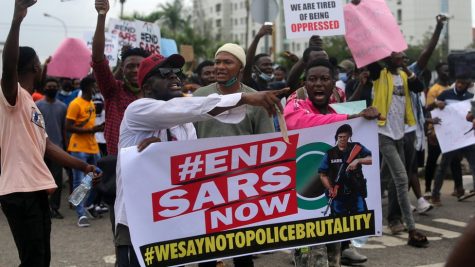The End SARS movement and it’s connection to Black Lives Matter
November 13, 2020
The “End SARS” movement erupted in Nigeria after a video surfaced from early October of SARS officers dragging two men out of a building and killing one of them.
SARS stands for Special Anti-Robbery Squad, which was developed in 1984 to combat crime and robbery. However, they’ve been known to abuse their power through beatings, sexual assault, hangings and more. The “End SARS” movement dates back to 2017, when the people of Nigeria expressed their experiences of abuse, at the hands of police officers, over social media.
The Nigerian government has made repeated claims that they would disband or reform SARS but has yet to do so. On October 11, 2020, they stated they would disband the police force, but Nigerian citizens are reluctant to believe they’ll carry out their promises.
On October 20, protesters at Alausa and Lekki toll gate in Lagos were attacked with gunfire after protesting for real reform from their government. Ten people died at Lekki and hundreds were wounded. Since the protests began on October 8, 56 people have died. The Lagos State governor tried to place blame on the protestors, claiming they were torching and looting buildings and “unleashing terror on citizens.”
After the incidents, the hashtag #LekkiMassacre went viral. Celebrities such as Beyonce, Cardi B, Drake, Rihanna and many others, have spoken out against SARS, bringing even more mainstream attention and an American connection to the Nigerians’ suffering.
The End SARS movement is not quite the same as the Black Lives Matter movement in the United States, but there are stark similarities.

The Black Lives Matter movement took off with immense speed in late May after a video surfaced of the killing of George Floyd by a Minneapolis police officer. The movement was first created in response to the killing of Treyvon Martin in 2013, but the recent killings of George Floyd and Breonna Taylor, among countless other innocent black people, has caused nationwide protests.
Police reform has also been a major issue in both the US and Nigeria.
In Nigeria, the imbalance and abuse of power at the hands of law enforcement is not a racial issue, instead, it is part of a bigger problem. The Nigerian government has a history of corruption and the people are victims of inadequate healthcare, education and poverty. The recent dealings with SARS have put the young citizens, who make up the majority of the population, over the edge. They’re calling for real change and reform, not just in the police force, but the entire government.
Throughout the six months of protests in the United States, young people have been the leaders of the Black Lives Matter movement. They feel that there needs to be deep, systemic change to fix the issues of racism in this country, as the United States itself was built on the exploitation of slave labor and continues to marginalize people of color.
Activists in the United States have been calling upon their peers to bring more attention and to help the protestors in Nigeria, emphasizing that all black lives matter, not just those in the US.
It is important that the activism people are engaging in to help the people of Nigeria has real results. With great amounts of unemployment due to COVID-19 and a hurting economy, on top of government corruption and a lack of basic human necessities, the Nigerian people are suffering.